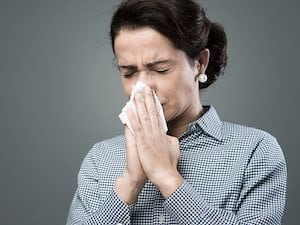The New Year is here, and while so many people have high hopes of good health for 2020, others are already suffering from the flu and other illnesses.
We are in the midst of a very active flu season. More than 6 million people in the United States have already had the flu this season, resulting in 55,000 hospitalizations and 2,900 deaths. Right now, the flu is considered widespread in Connecticut. Seven people in the state have died from flu complications this season, according to information complied through Jan. 4 by the Department of Public Health.
Influenza, or flu, is a contagious respiratory illness caused by a virus that infects the nose, throat, and sometimes the lungs. The flu virus can travel up to six feet after a patient coughs, sneezes, and talks. The flu can cause mild to severe illness, and at times can lead to death.
How do you know if what you have is a common cold or the full-blown flu?
While sometimes the cold and the flu can have similar symptoms, a few factors point to the flu. Patients suffering from either illness can experience sneezing, stuffy nose, sore throat, chest discomfort and cough. Fever, chills, body aches, fatigue and headache are more common with influenza.
Symptoms of a cold progress gradually, while onset of the flu is more abrupt. Flu symptoms will permeate the entire body. Coughing can be experienced with both cold and flu, but the cough may be more severe with flu. Cold symptoms are usually milder than flu symptoms. If you have any of these symptoms, contact your doctor or urgent care clinic.
There are several things you can do to reduce your chance of getting or spreading the flu.
First and foremost, it is not too late to get a flu shot. It’s the most effective way to prevent the flu during the season that usually peaks in February and March but can start as early as October and last through May. The vaccine protects against the strains of the flu that research predicts will be most common during the year.
It is especially important that people at high risk to suffer complications from the disease get immunized. People at high risk for the flu include infants younger than 6 months old, pregnant women, people over 65 years old, and those with chronic health conditions including asthma, diabetes, and heart and lung disease.
Other actions will help prevent the spread of the flu. Frequent hand-washing is the best way to prevent the spread of germs. Cover coughs and sneezes, using and disposing of tissues after a single use. When sick, avoid interacting with others to prevent the passing of germs. Avoid touching your eyes, mouth and nose.
By taking precautionary measures like getting a flu shot and practicing good hygiene, you can reduce your chances of contracting the flu and maximize your potential of good health in 2020.
To get a flu shot at a Hartford HealthCare GoHealth Urgent Care location near you, click here.
Dr. Virginia Bieluch is the chief of infectious diseases at The Hospital of Central Connecticut.



